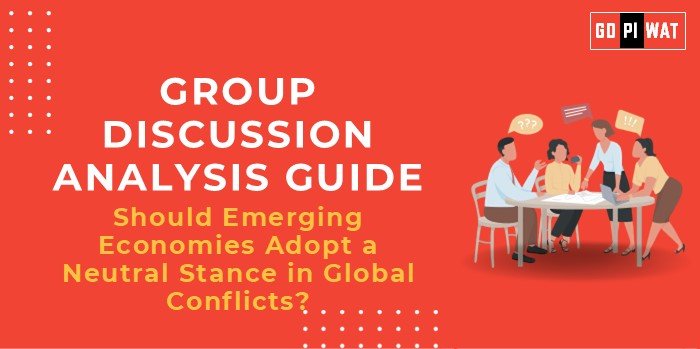📋 Group Discussion (GD) Analysis Guide
🌟 Should Emerging Economies Adopt a Neutral Stance in Global Conflicts?
🌐 Introduction to the Topic
Opening Context: “Emerging economies find themselves at the crossroads of global geopolitics, often pressured to align with powerful blocs or maintain neutrality in conflicts. This decision carries profound implications for their development and global standing.”
Background: Historically, neutrality has been a strategic choice for emerging economies, as seen in the Non-Aligned Movement (NAM) during the Cold War. Today, with shifting power dynamics, countries like India, Brazil, and South Africa grapple with balancing their national interests amid global conflicts.
📊 Quick Facts and Key Statistics
- 🌍 Emerging Markets GDP Share: Emerging economies contribute over 45% to global GDP (IMF, 2023).
- 💸 Global Military Spending: Conflicts impacted by these stances account for $2.2 trillion annually (SIPRI, 2023).
- 📈 India’s Global Trade Share: 40% of India’s trade involves nations on opposing sides of current global conflicts (Commerce Ministry, 2023).
- ⚖️ NAM Membership: 120 countries, mostly emerging economies, advocate neutrality in global politics (2024).
👥 Stakeholders and Their Roles
- 🏛️ Governments: Balance national security, trade relationships, and international obligations.
- 🌐 International Organizations: UN and regional alliances often mediate or influence decisions on neutrality.
- 🏢 Private Sector: Businesses are directly affected by economic sanctions or disruptions linked to conflicts.
- 🤝 Civil Society: Advocates for peace and humanitarian approaches, pressuring governments on their global policies.
🏆 Achievements and Challenges
- 🎯 Achievements:
- Peace Mediation: Neutral nations like Switzerland have historically facilitated conflict resolutions.
- Economic Stability: Neutral stances can safeguard trade relationships and foreign investment (e.g., UAE’s strategic neutrality).
- Global Credibility: Countries like India maintain strategic autonomy, enhancing their diplomatic standing.
- ⚠️ Challenges:
- Pressure from Major Powers: Emerging economies face diplomatic and economic coercion to align with blocs.
- Economic Risks: Neutrality may jeopardize access to key markets or investments due to sanctions.
- Moral Dilemmas: Remaining neutral in conflicts with significant human rights violations can attract criticism.
🌍 Global Comparisons
- 🌟 Success: Switzerland’s neutrality enabled it to become a global hub for diplomacy.
- 🌍 Struggle: South Africa’s neutral stance during the Russia-Ukraine conflict drew domestic and international backlash.
Case Studies:
- ⚖️ India’s Ukraine Policy: India abstained from condemning Russia at the UN, citing national interests while maintaining dialogue with all sides.
- 🌍 Brazil’s Role in BRICS: Advocated neutrality while pushing for multipolarity and conflict resolution through diplomacy.
📋 Structured Arguments for Discussion
- ✔️ Supporting Stance: “Neutrality allows emerging economies to focus on internal development while avoiding the repercussions of taking sides.”
- ❌ Opposing Stance: “Neutrality can appear passive, eroding a country’s moral authority and its influence in shaping global outcomes.”
- ⚖️ Balanced Perspective: “While neutrality offers strategic advantages, selective engagement in conflicts aligned with national interests can enhance global credibility.”
🛠️ Effective Discussion Approaches
- 🔍 Opening Approaches:
- Historical: “The Non-Aligned Movement during the Cold War laid the foundation for neutrality in global conflicts among emerging nations.”
- Strategic: “With 45% of global GDP stemming from emerging markets, their stance in global conflicts has far-reaching implications.”
- 💬 Counter-Argument Handling:
- Highlight the importance of strategic autonomy rather than blanket neutrality.
- Emphasize the need for moral leadership balanced with pragmatic national interests.
📈 Strategic Analysis of Strengths and Weaknesses
- 🟢 Strengths:
- Avoid entanglement in costly conflicts.
- Enhance diplomatic flexibility.
- 🟡 Weaknesses:
- Limited influence in global decision-making.
- Risk of alienating key allies.
- 🔵 Opportunities:
- Mediate and broker peace deals.
- Strengthen multilateral forums like BRICS or NAM.
- 🔴 Threats:
- Economic sanctions from major powers.
- Accusations of passivity or opportunism.
📚 Connecting with B-School Applications
- 🌏 Real-World Applications: Use cases of strategic decision-making in global supply chains and risk management.
- 🤔 Sample Interview Questions:
- “What are the economic implications of neutrality for emerging economies?”
- “Can neutrality in conflicts help or hinder a nation’s global influence?”
- 💡 Insights for Students:
- Study how neutrality impacts foreign investments.
- Explore the role of emerging economies in peace negotiations.


